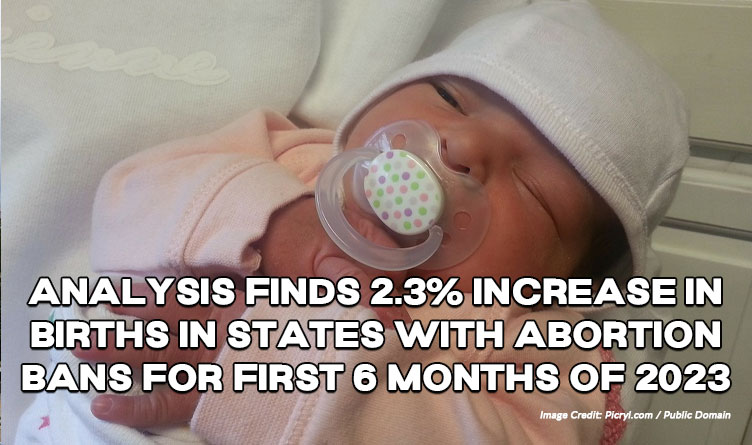Analysis is based on provisional data for first 6 months of 2023.
Image Credit: Picryl.com / Public Domain
By Bethany Blankley [The Center Square contributor] –
In the first half of 2023, roughly 32,000 babies were born in states that implemented abortion restrictions after the U.S. Supreme Court overturned Roe v. Wade last June, a 2.3% increase, according to a new analysis.
In the first six months of 2023, “births rose by an average of 2.3 percent in states enforcing total abortion bans,” leading to an estimated 32,000 births that might have otherwise been aborted, according to a new analysis published by the IZA Institute of Labor Economics initiated by the Deutsche Post Foundation.
“These effects may vary across demographic groups and tend to be larger for younger women and women of color; … vary substantially across ban states, with much larger effects observed in states that are bordered by other ban states and hence have long travel distances to reach facilities that remain open.”

Its November 2023 “Effects of the Dobbs Decision on Fertility” report states that the “U.S. Supreme Court decision in Dobbs v. Jackson Women’s Health Organization sparked the most profound transformation of the landscape of abortion access in 50 years. We provide the first estimates of the effects of this decision on fertility using a preregistered synthetic difference-in-differences design applied to newly released provisional natality data for the first half of 2023.”
The analysis is based on provisional data for the first six months of 2023. “If future research using finalized data and additional policy variation reveals continued substantial effects on birth, then we expect long-lasting and profound effects on the lives of affected pregnant people and their families, including effects on educational investment, employment, earnings, and financial security.”
As of Nov. 1, 2023, 14 states are enforcing bans on abortion in nearly all circumstances, the report notes. Because roughly 23% of American women seeking an abortion experienced an increase in driving distance to the nearest abortion facility (from 43 miles before Dobbs to 330 miles after Dobbs), the driving distance “represents the most profound transformation of the landscape of U.S. abortion access in 50 years.”
According to a different study by researchers from Johns Hopkins Bloomberg School of Public Health, nearly as many babies are believed to have been born in Texas alone since its new heartbeat bill went into effect Sept. 1, 2021.
Within eight months of the new law going into effect, there were nearly 9,800 live births in Texas from April to December 2022, according to the Johns Hopkins study. If the rate were consistent through November 2023, of an additional 1,225 live births a month, the number of babies born in Texas that otherwise might have been aborted is closer to nearly 32,000 since Sept. 1, 2021.

Suzanne Bell, a lead author of Johns Hopkins study, said their “findings highlight how abortion bans have real implications for birthing people, thousands of whom may have had no choice but to continue an unwanted or unsafe pregnancy to term. Notably, the majority of people who seek abortions live below or close to the poverty line. So many of these birthing people and their families were likely struggling financially even before the recent birth.”
State Sen. Brian Hughes, R-Mineola, who authored Texas’ heartbeat bill, told The Center Square, “Each of these lives is a gift of God and reflects His image. And since passage of the Heartbeat Act, we have drastically increased funding for expectant and new mothers and their babies.
“In Texas, we are proving that we can save the life of the baby while we love, and respect, and support the mother.”
In addition to signing the state’s first heartbeat bill into law, Gov. Greg Abbott signed bills into law extending Medicaid health-care coverage to 12 months post-partum, appropriated more than $447 million for women’s health programs and invested over $140 million in the Thriving Texas Families program.

Prior to Roe being overturned, “In 2020, approximately 1 in 5 pregnancies ended in abortion,” the IZA study states, noting that the majority of those seeking abortions, 75%, were low-income. Another 59% said they had previously given birth and 55% reported some kind of hardship including falling behind on rent or losing a job.
Hughes’ bill, SB 8, passed the Texas legislature with bipartisan support and was signed into law in May 2021. By October 2021, a federal judge halted it. By April 2022, the Fifth Circuit overturned that ruling and ended all challenges to the law. After the Supreme Court overturned Roe v Wade in June 2022, Texas’ law went into full effect in August 2022.
Texas’ law is considered to be among the strictest in the nation. It bans abortions from being performed in Texas as soon as a heartbeat of the preborn baby is detected, with limited exceptions. It created a second-degree felony offense for a person who knowingly performs, induces or attempts an abortion. The offense is enhanced to a first-degree felony if an unborn child dies from an abortion. Anyone who violates the law performing an abortion can also be subject to a minimum civil penalty of $100,000 for each violation, with exceptions.


About the Author: Bethany Blankley is a writer at the Center Square, Patheos/Hedgerow, political analyst and former press secretary at Capitol Hill / NY / WDC. Follow Bethany on Twitter @BethanyBlankley.



2 Responses
A question. In texas, how many of these live births are babies of pregnant women who crossed over from Mexico while pregnant?
All babies deserve to be protected.
The statistics do not always prove the point being made.
We had Covid, people lost jobs, many of these people may have been part of the group and perhaps are not keeping busy at work, (we know that more babies babies are born are a result of time off for the holidays and cold weather season too) Couldn’t the same be said about women getting pregnant because they are bored?
I know this has been said, but abortion is not birth control. Birth control is not having sex outside of marriage and if you are married, you should already be preparing to raise a family. Last I looked, the government and welfare programs already providing help for those in need. If they are poor and without, based on the subsidies these programs offer, the baby will only bring more money into their pocket, but if they don’t have the baby, they still have to pay their bills.
If the women are getting an abortion, that is a choice they make, not forced on them. (Except for maybe the physiological one that plays out between the mom and the people around her, planned parenthood not telling them the truth, a beating heart, a fully developed baby with a brain, eyes, ears, fingers, and toes. If they get pregnant that is a choice they make, not forced on them. They know having sex can result in a pregnancy. Where are the natural consequences of their actions? Pregnancy is not a disease or a result of an accident. Having a baby is a gift. If they only would wrap their minds around that.
Repubs need to stay away from abortion and Obamacare – they will lose votes.
Also, to not have an exception for women who are raped is disgusting and was a big campaign ad in the last election. I won;t donate to anyone who opposes that.
Since 1975 there were 20 million abortions. 80% were by low-income unwed welfare women. If those babies had been born America would be Marxist and the Leftists would have total control. The kids would have grown up without fathers.
A fetus can’t survive until at least 20 weeks. Will you regulate sperm too? It’s alive.
Don’t push your religious views into law. If you’re really serious, adopt some of them or at least pay for them.
Abortion is all the Dems have. Don’t give them Obamacare too.